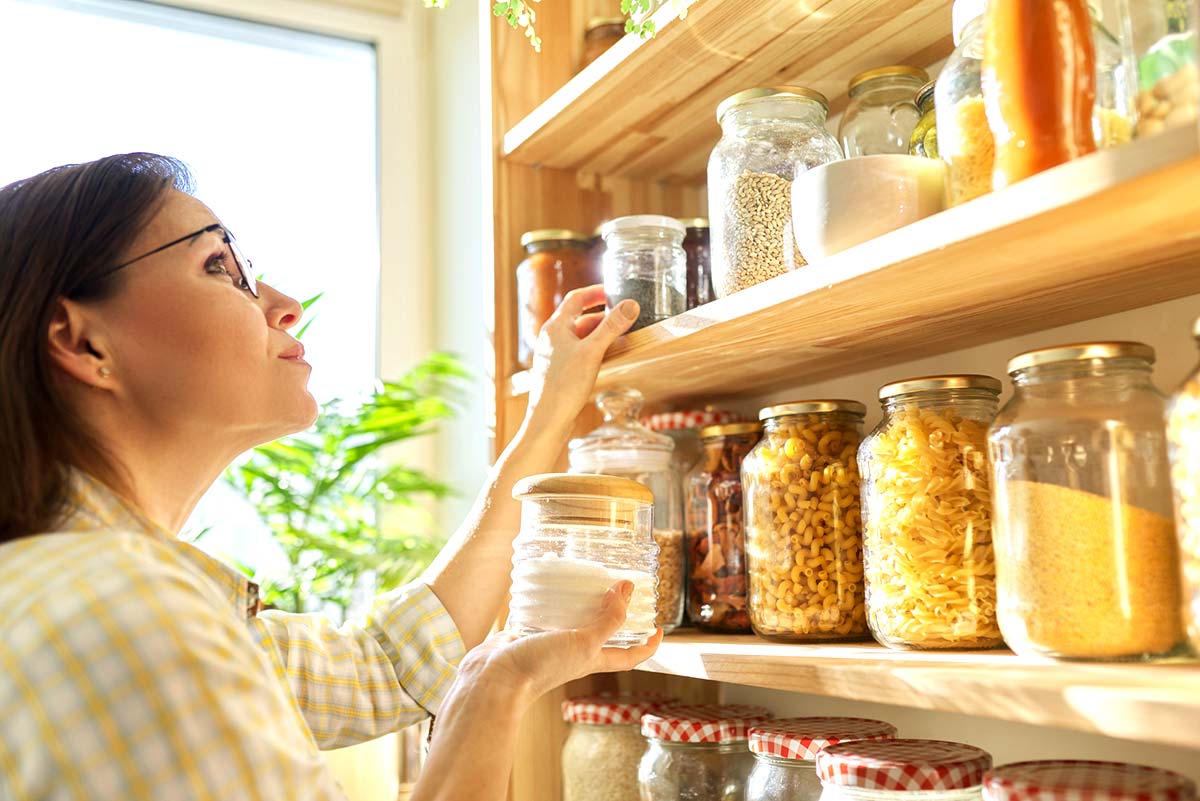5 Simple Pantry Swaps to Help You Along Your Road to Better Health
Starting your journey to health can be a difficult and confusing road to navigate, especially early on.
While you might knowingly avoid those highly processed, packaged foods that you know are loaded with added sugars and carbs. There are quite a few pantry staples that have the same hidden, damaging ingredients that you might not know about.
When I first started my wellness journey close to seven years ago, I knew that I wanted to cut out processed carbs and added sugars. So, I stopped drinking sodas, and we stopped buying cookies, candies, and other processed garbage that I knew wasn’t healthy for me.
However, what I never thought about, were the items in my pantry that were just as damaging to my health.
- What’s so unhealthy about salad dressings?
- Isn’t low-fat mayonnaise better for me than regular?
- What is the big deal with eating products with dextrose and maltodextrin?
I used to think about these questions a lot. I would read the ingredient labels of the items in my fridge and pantry and think to myself, “This looks ok. It’s got healthy oil in it and honey in it instead of sugar.”
To be perfectly honest, I didn’t even think about that last question. I really didn’t even know what dextrose, maltodextrin, or any of the other food additives even were or how they might impact my
body.

In this article, I’m going to discuss some tips on how to read ingredient labels and make some quick and easy pantry swaps to help you move forward on your journey of health.
What’s so bad about salad dressings?
Inherently, there’s nothing actually wrong with using salad dressings. In fact, there is a multitude of vitamins that are fat soluble. They need fat to be absorbed and utilized by the body appropriately, so eating fat with a salad is important.
It’s not the fact that it’s dressing. It’s what’s in the dressing itself that might be damaging your health.
Many salad dressings are made using supposedly “heart healthy” oils like canola, soybean, or some “vegetable oil” mix. These oils are far from healthy as they are industrially processed seed oils that oxidize easily and are very inflammatory in the body. They are also disproportionately high in Omega 6 fatty acids that compete for space in the body with more beneficial Omega 3 fatty acids.
On top of the inclusion of inflammatory seed oils, many dressings are marketed as “low/reduced fat.” include added sugars to compensate for the missing fat. Some of those sugars come in the form of high fructose corn syrup which also increases inflammation in the body.
But what about fat-free products like fat-free mayonnaise? Aren’t those products better for me than the full-fat versions?
I really did think this was true for a very long time. I believed that if I weren’t consuming extra fat and kept my calorie consumption low, I would lose weight and be healthy.
The problem with low-fat, reduced-fat, and fat-free products is that companies must compensate with added sugar, thickeners, and gelling agents to get the taste and consistency to mimic the full-fat version of the product.
These “better-for-you” products create the same issue with your body that the low-fat salad dressing causes. Oftentimes the product, like mayonnaise, is made with inflammatory seed oils, like soybean or canola oils, along with added sugars to make the product more palatable. Those added sugars and seed oils cause inflammation, higher insulin responses, and potential blood sugar crashes.
So, then what is the big deal with eating products with dextrose and maltodextrin or other additives?
Many packaged foods, including deli meats, bread, or sauces, contain numerous food additives to extend shelf life or improve the taste/consistency of the products into which they are added. Even as late as this past year, looking at the impact of these additives on my health wasn’t even something that was on my radar.
My family very frequently bought deli meat as a quick meal, especially when we were out and about with the ridiculous number of activities our kids are involved in. I always thought, “Oh, deli meat is a food option. It’s fast and high in protein, and why would anything need to be added to plain turkey, chicken breast, or roast beef.”
I would experience some stomach issues after I ate deli meat, but I would chalk that up to the stress of eating on the run while shuttling kids to and from basketball or soccer games. Turns out, it wasn’t the games. It was the deli meat.
Most deli meats contain maltodextrin, dextrose, or some other added starch, like potato starch.
It was these additives that my body was reacting to in such a negative manner.
Maltodextrin, dextrose, and potato starch all turn into sugar in the body because they are all carbohydrates. Maltodextrin has a glycemic index (GI) of between 85-130, which is significantly higher than that of table sugar, which is in the mid-50s for GI. That means that maltodextrin spikes blood sugar much faster and harder than even regular sugar.
All these additives can be found in what might seem like completely innocuous foods like deli meat, rotisserie chicken, and most canned or bottled goods. All of these create blood sugar spikes and can increase inflammation in the body, especially if you are already metabolically damaged or have T1 or T2 diabetes.
Below is a quick list of tips and pantry/fridge substitutions that you can make that can help you avoid these inflammatory ingredients and help you progress down your path towards better health Tips:
- Start reading the ingredients list – This is an important practice to start if you’ve never done it before. Understanding what you’re putting into your body is critical for knowing how different foods affect your health. Avoid products with added sugars, seed oils, and added fillers like maltodextrin, hydrolyzed vegetable proteins, or dextrose. Brands such as Primal Kitchen or Chosen Foods have great ingredients for foods like sauces, salad dressing, and mayonnaise.
- Get rid of any products that are made with industrial seed oils – Soybean, canola, flax, corn, safflower, grapeseed, and any other seed oils are very inflammatory to the body. Avoid these even if they are labeled as “organic.” That just means they are organic trash. Stick to products made with avocado, olive, or coconut oils.
- Get rid of any “reduced/low/no-fat” products – These products are, in general, garbage. They are filled with inflammatory added sugars and seed oils to make the product more palatable. Stick to products that are full fat, like plain whole milk Greek yogurt or good-quality mayonnaise from brands like Primal Kitchen or Chosen Foods.
- Replace cooking oils – Replace inflammatory seed oils, like soybean, corn, or canola oils, with avocado oil, coconut oil, or olive oil. Another great replacement fat to cook with are animal fats such as clarified butter (Ghee), lard, tallow, bacon fat, or even duck fat.
- Focus on whole foods and avoid ultra-processed foods – Focusing on eating whole foods with minimal ingredients is the best thing that you can do to improve your health. Even with snacks, try to focus on whole food snacks like hard-boiled eggs, canned sardines, canned tuna, olives, or even beef jerky (no sugar added) for satiating, high-protein snacks.
Changing your lifestyle can be ridiculously difficult; believe me, I know since I’ve been there.
The Bible states, “I can do all things through him who strengthens me.” (Philippians 4:13). It was only through my relationship with God, knowing who I am through Him, that I have been able to do anything, especially something as difficult as changing how I viewed food and the way I eat. Change is hard, but through the support of God, anything is possible.

If you want to eat better, get stronger, and lose weight, then let’s talk. Request a call with me now.


Thankfully, I knew most of this information. I like how you presented it; very clear and simple. It can be frustrating to always read labels but it is worth it. And as you pointed out, just because a product is organic does not mean it has healthy ingredients.